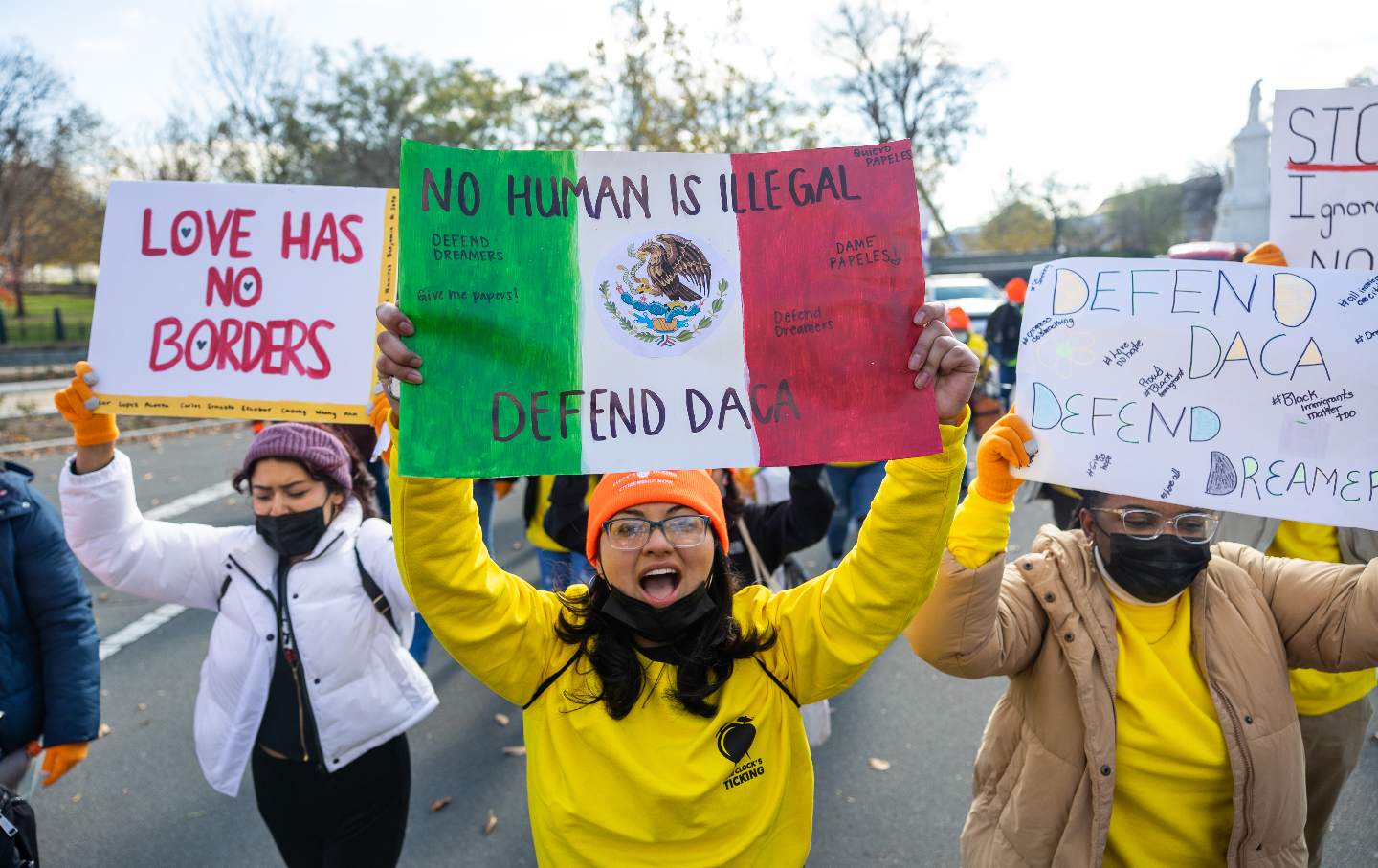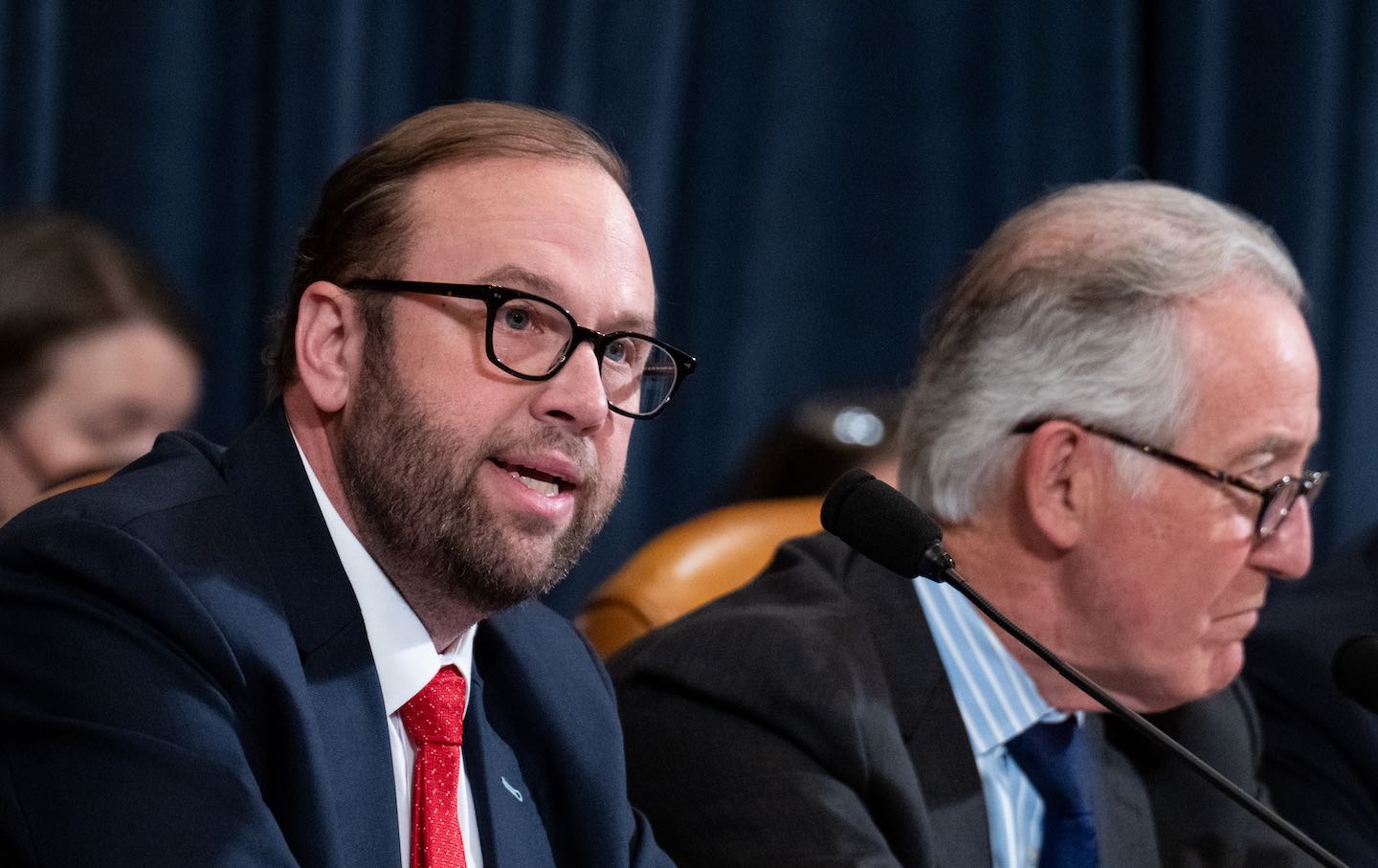Without Expanded DACA Protections, Undocumented Students Are Being Left Behind
Around 80 percent of the nearly 120,000 undocumented students who graduated high school in 2023 don’t qualify for DACA.

Pro-DACA protesters hold a march outside the US Capitol.
(Nathan Posner / Getty)At age 15, Luis came to the United States from Veracruz, Mexico. Today, he’s a 22-year-old senior at Rice University, studying math and planning to go to graduate school next fall.
His grandparents are US citizens, and his mom has applied for a green card. Since Luis was brought into the US as a minor, you might think he qualifies for Deferred Action for Childhood Arrivals (DACA), which shields young adults who arrived in the US as children from being deported, offering them work authorization along with temporary and renewable legal status. “I checked all the boxes, except for one,” said Luis, “which is that you have to have been here since 2007.”
Around 80 percent of the nearly 120,000 undocumented students who graduated high school in 2023 do not qualify for DACA, and even fewer undocumented high school graduates will qualify this spring. Yet nearly three-fourths of Americans are in favor of “granting permanent legal status to immigrants who came to the US illegally as children.” Despite its popularity, when Obama tried to update the program to include those who had been present in the US since 2010, it was challenged in court by Texas and 25 other states, arguing that it was an overstep of presidential authority. In 2016, the Supreme Court upheld this view, leading to the Obama administration rescinding the update.
For a current minor to be under 18 when they came into the United States, the earliest they could have arrived is 2005. According to the President’s Alliance on Higher Education and Immigration, this means a majority of undocumented students entering higher education are no longer eligible for DACA. “That number is going to continue to decline, and the population [of those eligible for DACA] is going to get smaller because they’re not updating [the policy],” said Dr. Felecia Russell, director of the Higher Education Portal at the President’s Alliance and former Dreamer.
Sam is a 20-year-old undocumented student who qualified for DACA but wasn’t able to apply before the Trump administration terminated the program in 2017. In 2020, the Supreme Court decided that cancellation was unconstitutional, but did not give a clear directive on the constitutionality of DACA itself. Currently, no new DACA applications can be processed, and only current DACA holders can apply for renewal.
Sam said that not being allowed to file was heartbreaking. “I remember being very upset and emotional. I was 14 and in high school, and I just thought, ‘My one chance of living a normal life, completely shot in front of me,’” she said. For her, being undocumented “feels like you can never truly relax. Things tomorrow could get worse.”
People like Sam are left without a Social Security number, making it harder to find work. In high school, she was able to get a job at a Mexican restaurant, but they had to pay her in cash. Most internships are also off the table. Evelyn, an undocumented student whose dream is to work at NASA, can’t even apply. “At the end of the day, you could have the most stellar degree, but if you have zero experience, it’s going to be really tough to find a job,” she said.
Sam was able to get an unpaid internship at a law firm. But because Texas, like most states, doesn’t allow undocumented individuals to apply for a driver’s license, she had to give it up. “I can’t ask my friends for a ride every single day. I can’t afford to take an Uber every single day, and the public transportation in Houston is not good, efficient, or reliable.”
“If you can’t work, you can’t contribute to your education. One way that a lot of students pay for their education is by having a job on campus or by doing work study,” said Russell. But undocumented students also face barriers to taking out loans and cannot apply for scholarships that require applicants to be US citizens or legal permanent residents. “We know that the biggest barrier to higher education for people in general is the cost. Now, here’s a group of folks who cannot access federal financial aid, along with states that don’t provide undocumented students with access to in-state tuition rates,” said Russell.
In 2021, undocumented students made up less than 2 percent of the population of students enrolled in postsecondary education programs, compared to around 6 percent in 2019. “The only university that was giving really good financial aid [to undocumented students] in Texas was Rice,” said Luis, who completed two years at a community college before transferring. Outside of Texas, the schools that offered substantial aid were private schools or Ivy Leagues. “My brother is also undocumented. He’s a freshman in high school right now,” said Luis. “I feel worried because what if he doesn’t get into these colleges? We have to be perfect students in order for us to get opportunities.”
The problem, as Russell puts it, is that “DACA itself was never a permanent fix.” The policy was a result of the Obama administration’s taking unilateral action because Congress did not pass the Development, Relief, and Education for Alien Minors (DREAM) Act, which would have granted similar protections to undocumented individuals brought into the US as minors. President Biden has voiced support for DACA and moved to expand federal health insurance programs to current DACA holders, but has not moved towards an update of the policy.
Now, according to Russell, we need to turn back to Congress. The American Dream and Promise Act, which would expand DACA protections for millions, was introduced again last June. The bill previously passed the House in 2019 and 2021 but has yet to pass the Senate.
But an expansion won’t apply to any undocumented individual brought in as a child in perpetuity. “Under the American Dream and Promise Act, you have continuously lived in the US since January 1, 2021, and it would be great if we could get it into law,” Russell said. “No policy is going to be perfect. This one is not perfect, but it is good.”
Popular
“swipe left below to view more authors”Swipe →As a former undocumented student herself, Russell said she had no autonomy over her life. “I couldn’t drive, I couldn’t get a driver’s license, and I couldn’t get a job on campus, even though I needed one terribly,” she said. “Probably all the things that I’m doing, or the things I’ve accomplished, I would not have done without this policy.”
Sam, who came to the US at 3 years old, recently spoke to a lawyer about her situation. “They told me that my only true pathways to citizenship would be: Congress intervenes and passes something, I get married, or I return to my country of birth for at least 10 years and try to get in the so-called ‘right way,’” she said. “Hearing that—I always knew these things were true—but hearing that spoken out loud by a legal professional broke something in me.”
Thank you for reading The Nation!
We hope you enjoyed the story you just read, just one of the many incisive, deeply-reported articles we publish daily. Now more than ever, we need fearless journalism that shifts the needle on important issues, uncovers malfeasance and corruption, and uplifts voices and perspectives that often go unheard in mainstream media.
Throughout this critical election year and a time of media austerity and renewed campus activism and rising labor organizing, independent journalism that gets to the heart of the matter is more critical than ever before. Donate right now and help us hold the powerful accountable, shine a light on issues that would otherwise be swept under the rug, and build a more just and equitable future.
For nearly 160 years, The Nation has stood for truth, justice, and moral clarity. As a reader-supported publication, we are not beholden to the whims of advertisers or a corporate owner. But it does take financial resources to report on stories that may take weeks or months to properly investigate, thoroughly edit and fact-check articles, and get our stories into the hands of readers.
Donate today and stand with us for a better future. Thank you for being a supporter of independent journalism.
Thank you for your generosity.
More from The Nation

Donald Trump Is Scared of Women Voters on Abortion Donald Trump Is Scared of Women Voters on Abortion
He evaded Time magazine’s abortion questions repeatedly. What can we learn? He will do anything that benefits him.

Republican Senators Are a Bigger Threat to the Constitution Than Trump Republican Senators Are a Bigger Threat to the Constitution Than Trump
Senators who are supposed to check Trump’s abuses are supporting his immunity claims instead.

I’m Sad for Kristi Noem’s Daughter, Not Just Her Puppy I’m Sad for Kristi Noem’s Daughter, Not Just Her Puppy
The South Dakota governor traumatized her child by killing her dog.

To Imagine a Better Future, Look to John Rawls To Imagine a Better Future, Look to John Rawls
While we cannot change the world with dreams alone, moral ideas can inspire people to come together and change their societies for the better.

The Bipartisan War on Pro-Palestinian Activism The Bipartisan War on Pro-Palestinian Activism
A House bill asks the Treasury to revoke the nonprofit status of suspected “terrorist supporting organizations.” Advocates are already singling out Muslim and Palestinian groups.

Why Kristi Noem Thinks Killing a Puppy Is Good Politics Why Kristi Noem Thinks Killing a Puppy Is Good Politics
The South Dakota governor is betting that GOP voters love performative cruelty, even if it’s inflicted on an adorable young doggy.


